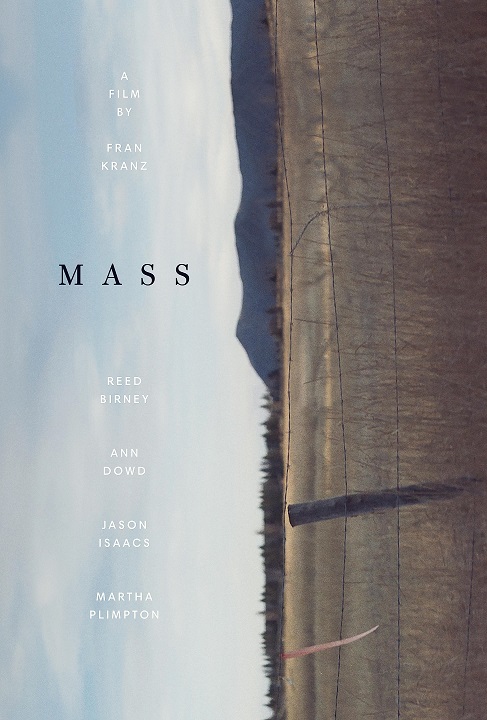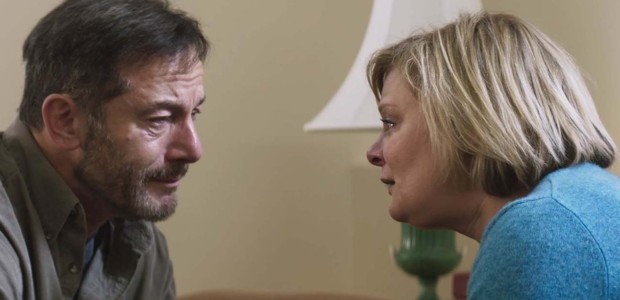Just from reading a short description or synopsis of the film, it’s obvious that MASS is going to be a hard sell to audiences. A movie that deals directly with the epidemic of mass shootings in America over the last decade, the film takes place entirely in one location, primarily with just four actors. Its writer and director, Fran Kranz, is a first-time filmmaker primarily known for his varied acting career, and most of his well-known works are genre-based, while MASS is heavily grounded in realism. The film purposefully has no extreme conflicts or incidents — it’s simply four people talking for two hours, about a subject so many people at this point in time are either numb to or still hurting from.

That being said, if audiences give MASS half a chance, they’re likely to be pleased, if not astounded. What Kranz has done is made a movie that not only feels timely but essential, acting as almost a collective cathartic moment for a country held so long under the grip of seemingly senseless tragedy. I’m not the first person to point out the trend of mass shootings has only gone down in the past year thanks to an actual pandemic breaking out, replacing one national crisis with another (not to mention one that’s been as badly mismanaged, with a tragically significant death toll). In the midst of the COVID-19 breakout, MASS feels perversely nostalgic, an artifact from an earlier time. Despite the whirlwind of new tragedies, MASS allows its viewers to process events of only a few years ago while keeping their memory alive, making sure that they don’t become just everyday occurrences that are easily forgotten.
Shot in an Episcopal church in Idaho, MASS sees a group of people united by tragedy gather to have a momentous discussion. They’re made up of two couples: the more suburban Jay (Jason Isaacs) and Gail (Martha Plimpton), and the upper middle class Linda (Ann Dowd) and Richard (Reed Birney). Their arrival is given a ton of weight by the characters we meet first: church employee Judy (Breeda Wool), staff member Anthony (Kagen Albright), and Kendra (Michelle N. Carter), who appears to be a legal representative. As Judy and Anthony prepare one of the church’s meeting rooms, Kranz starts building an incredible amount of tension, with Judy fussing over infinitesimal details such as where a tissue box should be placed and how much food to provide. The tiptoeing by the staff implies the severe delicate nature of the situation, and Kranz and his editor Yang Hua-Hu reinforce this by letting single takes run on for minutes at a time.
It doesn’t take too long for the film to reveal exactly what the connection is between these two couples, and by the breadcrumbs it drops along the way it’s fairly easy to assume what that is — even the film’s title is a dark double entendre for both mass shootings and the religious ceremony of communion. Yet part of MASS’s spell is how it keeps its information guarded for as long as it does, the truth too painful to even speak aloud. Until, of course, the dam bursts, and the couples let loose grievances, thoughts, emotions and insights that even they themselves seem to be articulating for the first time.
To say MASS’s core ensemble of actors are fantastic feels like too small a word — they are the movie, with Kranz’s every choice following their lead. What Isaacs, Plimpton, Dowd, and Birney do is remarkable, given the freedom their writer-director affords them. Rather than indulge in show-stopping moments for their reel, the foursome keep themselves as honest and grounded as possible. No one feels like they’re reaching for an Oscar nomination here, and neither does Kranz, making sure not to give the film any quirks or flourishes that it doesn’t need. In interviews about the film, Kranz hints at the subject matter being very personal to him, and without reading (or digging) too much into that, the movie speaks for itself in terms of its no-frills approach, becoming a film with dialogue that’s heartfelt rather than calculated toward getting an audience or Academy voter response.
It’s true that MASS is one of those actor-based movies that could conceivably have been a play, as there’s nothing quintessentially cinematic about the film. Yet as theatre continues to shrink into becoming exclusively the province of the ultra-rich (never mind the fact that COVID means that no theatre can take place at the moment), MASS feels like the best possible medium for this story to be told. Certainly Kranz’s deliberate pacing and tone couldn’t be easily replicated on stage, the language and rhythm of the movie carrying an amount of tension akin to a horror film, with the truth standing in place of any monster lurking around the corner. Past that point of revelation, MASS gains its dramatic tension from the characters, as they — and the film — attempt to solve an unsolvable problem, grasping at any straws they can to try and find reason, meaning, and forgiveness. There’s no pat conclusion to the movie, but there is resolution. The answers to the real-life problems that caused the film’s tragedy are still out there, but the answer as to how to cope with the aftermath is the same as it’s always been: to bring people together. MASS is an honest attempt to do just that.
Tags: Ann Dowd, Breeda Wool, Darren Morze, Drama, Fran Kranz, Jason Isaacs, Kagen Albright, Martha Plimpton, Michelle N. Carter, Reed Birney, Ryan Jackson-Healy, Sundance, Sundance Film Festival, Yang Hua-Hu



No Comments